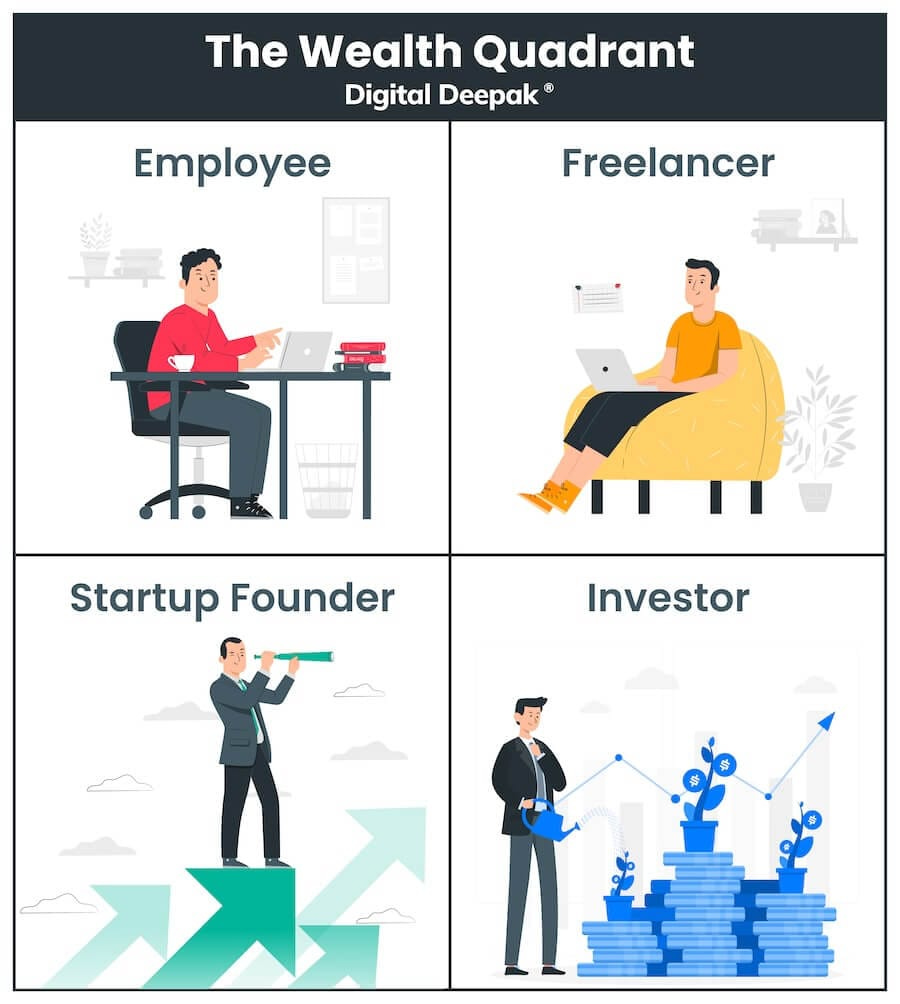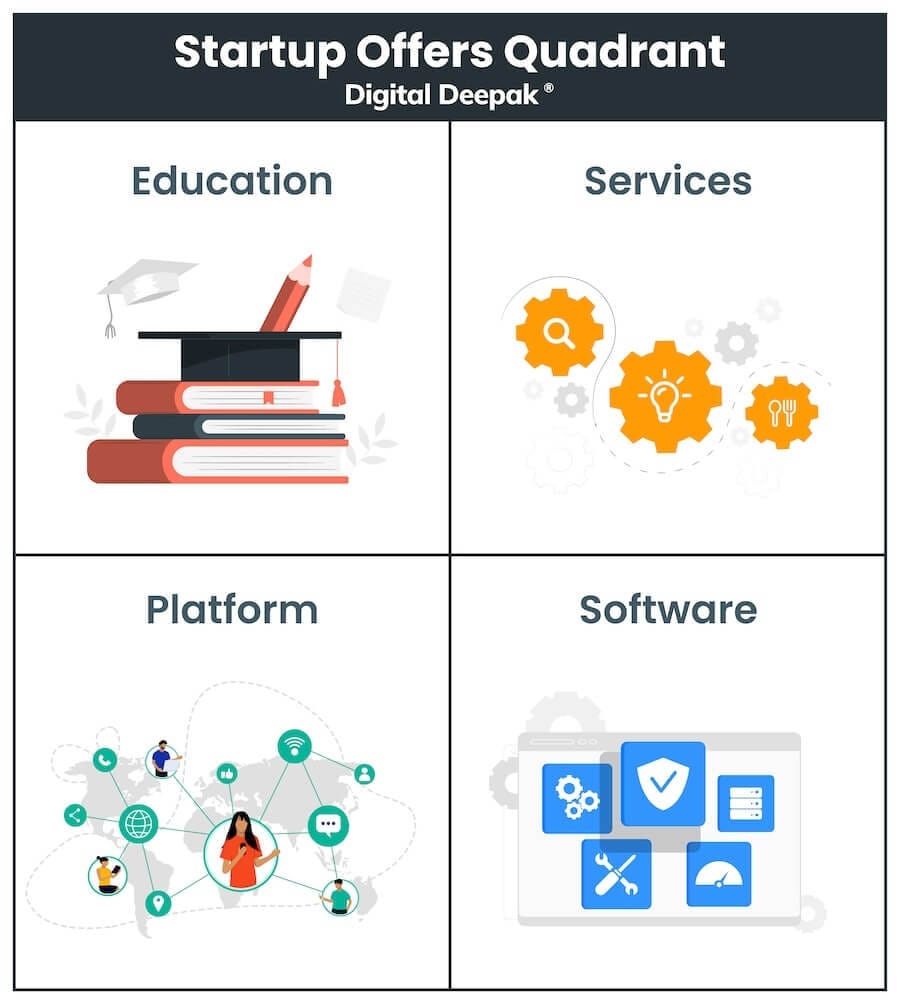The EFSI Wealth Quadrant
The Wealth Quadrant
For as long as I can remember, I have wanted to become a startup founder. I wanted to be in business. The uncertainty of running a business not only keeps you active mentally but also can be profitable if you do the right things.
The reason why most businesses fail is not because business is risky but because people do not know how to do the right things. My first attempt at building a startup failed because I didn't know what to do. I started a motorcycle blog called BikeAdvice and grew it to a million page views a month. But I sold that blog. So I can't say it failed but it failed to become the business that will help me retire. I learned the hard way that you can't make much with just display ads revenue.
I came to Bangalore and worked at Practo, Instamojo, and Razorpay to learn how startups are built and scaled. I learned a lot and I was impatient to become a startup founder again. In the process, I did employment and freelancing to pay the bills and have a roof over my head.
This is how everyone's journey is going to be. Unless the job is so rewarding and gives you startup-like flexibility in your work, you might be better off starting something of your own.
Once you have earned enough wealth with your startup, you can become a full-time investor and just retire to follow your hobbies.
Some people do skip the startup founder stage. They make so much with their employment and stock options from the job that they can jump to the investor stage directly.
Unless you are working in an early-stage startup that has a very high upside potential, your best shot at creating wealth is going to be startups.
If you have inherited a lot of money and you just need to manage the growth of the capital, you can directly jump to the investor stage but that's not for most people here, including myself.
I don't think I need to convince you further that startups are going to be vehicles for your financial future.
The next question is, what kind of startup?
You need to unlearn what you have learned in the first place. If you have been watching Shark Tank USA or Shark Tank India, you might have a very vague idea about what it means to build a startup.
First things first, do not start an eCommerce store or a D2C brand. Some people have built a successful D2C brand but it's not my cup of tea for a couple of reasons.
Firstly, D2C brands thrive on trends. One week it's bamboo towels and another week it's the latest health supplement. Unless you know how to look for trends and capitalize on them, you will not be able to make it a D2C brand. You also have to invest in production, acquisition of raw materials, warehousing, logistics, and unsold inventory. You will have to return to original orders which do not go through and it just adds chaos to your life. You don't want that if you are looking for freedom and peace with your startup.
Another major reason why I do not prefer starting an e-commerce company is that big brands like Amazon and Flipkart spend more than they earn for years to capture customers and increase their brand value. They have funding in the billions of dollars and they can out-spend other companies who are competing for the same keywords. You can only compete with them if you are also able to raise venture capital funding and can afford to run into losses for a while until you get a critical base of customers.
I prefer bootstrapping a startup until a point of maturity before raising any funding rounds. Many startups raise money just based on an idea, but many of them also fail within a few years. Bootstrapping helps you get disciplined in the first few years. This involves being humble, learning from the environment, listening to the customers, and most importantly, being frugal.
Constraints encourage us to be creative and most creative ideas come to us when we have constraints. The financial constraint of having to run a business without external funding creates a very solid foundation on top of which a big company can be built in the future. The bootstrapping years cement the culture of your startup.
So if you have to bootstrap a startup, how do you go about it?
There are 4 major offers you can create in your startup. They are Education, Services, Platforms, and Software.
Starting with education services doesn't cost any money. I started mentoring people in digital marketing. That's how I generated enough cash flow to setup my digital marketing agency that provided services. Which I rolled into making a software called OptinChat. And now I run a platform to hire digital marketers where there is a match of demand and supply.
Companies that want to hire digital marketers contact us and we supply them trained talent who have graduated from our courses. Our platform, though, is in a very early stage without software powering it. Eventually, we will be able to build a much more robust platform.
If you want to build a startup of your own, build your brand, and a community around your brand, and start mentoring people. That's the best way to get started. Once you have built your fan base, you can leverage that community for hiring and building your team. Your team can help you build a services agency that generates more cash flow.
Services don't mean that you should only offer services to B2B such as digital marketing services. Even in B2C, a personalized coaching program with multiple mentors or account managers is a service. A service is something that cannot be scaled as a product and needs a team to execute and deliver. It might not scale very fast but can be profitable enough for you to take that money and invest it into something more scalable.
This is my recommended approach because this is what has worked for me and many people in the industry. In future emails, I will cover some case studies that illustrate how people have followed a similar path to build a successful, bootstrapped, and profitable startup for themselves.
Only after your startup has reached this stage I would recommend raising funds for the startup. Do not go to investors with an idea because what you want to execute will be influenced by the investors.
Unpopular opinion but the truth, most investors do not know anything about business. They are just managers of capital and that capital is drying up. You need to choose your investors carefully but that comes after a certain point in your startup's maturity.



